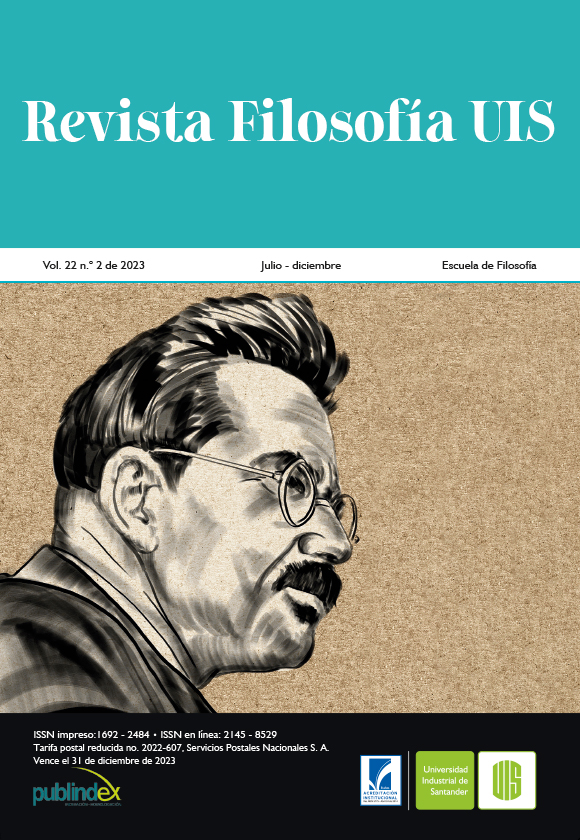Hannah Arendt: Civil Disobedience As An Expression Of Political Freedom In Dark Times
Published 2023-07-05
Keywords
- Civil Disobedience,
- political action,
- freedom,
- citizen protests
How to Cite
Copyright (c) 2023 Revista Filosofía UIS

This work is licensed under a Creative Commons Attribution 4.0 International License.
Abstract
The aim of this paper is to analyze Arendt’s reflections on civil disobedience. According to Arendt, this type of action cannot be confused with conscientious objection. In the specific context of the American Republic, civil disobedience is a collective action that it is compatible with the spirit of the constitutional laws, due to the citizens can assert their freedom of dissent against unjust measures, when these are taken by the government in power. In this way, for Arendt, civil disobedience promotes the creation of a public space for the exercise of citizen freedom in the face of the dangers of depoliticization, when these are contained in governmental agendas that seek to satisfy the interests of certain political parties and pressure groups. From this perspective, I try to explain how this type of action reaffirms the power of citizenship and it breaks with social conformism; this action opens public spaces for direct participation and revitalizes political life in the context of democracies in crisis.
Downloads
References
- Arendt, H. (1951). The Origins of Totalitarianism. Harvest Book.
- Arendt, H. (1970). On violence. Harvest Book.
- Arendt, H. (1972). Crises of the Republic. Harcourt Brace and Jovanovich.
- Arendt, H. (1997). ¿Qué es la política? Paidós.
- Arendt, H. (1998). The Human Condition. The University of Chicago Press.
- Arendt, H. (2003). Responsibility and Judgment. Schocken Books.
- Arendt, H. (2005). Ensayos de Comprensión 1930-1954. Caparrós Editores.
- Arendt, H. (2006). On revolution. Penguin Books.
- Arendt, H. (2019). Pensar sin asideros. Ensayos de Comprensión 1953-1975. Volumen I. Página Indómita.
- Birulés, F. (2007). Una herencia sin testamento: Hannah Arendt. Herder.
- Butler, J. (2017). Cuerpos aliados y lucha política. Hacia una teoría performativa de la asamblea. Paidós.
- Butler, J. (2020). La fuerza de la no violencia. Paidós.
- Cohen, C. (1966). Civil Disobedience and the Law. Rutgers Law Review, 3(1), 1-17.
- Fantauzzi, S. (2018). The Transmission of the Revolutionary Spirit: Reflections on Civil Disobedience in Hannah Arendt. Russian Sociological Review, 17(4), 131-143.
- Gines, K. (2014). Hannah Arendt and the Negro Question. Indiana University Press.
- Kateb, G. (2013). Existential Values in Arendt's Treatment of Evil and Morality. En S. Benhabib (Ed.), Politics in Dark Times. Encounters with Hannah Arendt (pp. 342-373). Cambridge University Press.
- Nussbaum, M. (1999). The Fragility of Goodness: Luck and Ethics in Greek Tragedy and Philosophy. Cambridge University Press.
- Petherbridge, D. (2016). Between Thinking and Action: Arendt on Conscience and Civil Disobedience. Philosophy and Social Criticism, 42(10), 971-981.
- Pitkin, H. (1995). Conformism, Housekeeping, and the Attack of the Blob: The Origins of Hannah Arendt's Concept of the Social. En B. Honig (Ed.), Feminist Interpretations of Hannah Arendt (pp.51-82). Pennsylvania State University Press.
- Rawls, J. (1971). A Theory of justice. Harvard University Press.
- Smith, V. (2009). Hannah Arendt on Civil Disobedience and Constitutional Patriotism. En R. Berkowitz, J. Katz & T.
- Keenan (Ed.), Thinking in Dark Times: Hannah Arendt on Ethics and Politics (pp. 105-112). Fordham University Press.
- Straehle, E. (2018). Hannah Arendt y los griegos: apuntes acerca de un malentendido. Logos. Anales del Seminario de Metafísica, 51, 83-84. Ediciones Complutense.
- Thoreau, H. (2011). Civil Disobedience. Empire Books.
- Wollin, R. (2003). Los hijos de Heidegger: Hannah Arendt, Karl Löwy, Hans Jonas y Herbert Marcuse. Editorial Cátedra.
- Young-Bruehl, E. (2004). Hannah Arendt: For Love of the World. Yale University Press.
- Zerilli, L. (1995). The Arendtian Body. En B. Honig (Ed.), Feminist Interpretations of Hannah Arendt (pp. 167-193). Pennsylvania State University Press.

